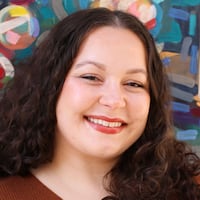Now, TechElevate has expanded with free digital literacy classes for senior citizens and a team of 50-60 volunteers, all while preparing for their own futures.
Shubhangi Srishti, 16, who is an incoming junior at Lakota East; Shrey Rana, 15, an incoming junior; and Ava Kohlhaas, 16, an incoming senior, use Carnegie Melon University’s coding curriculum to teach free in-person and online coding classes and have developed their own digital literacy curriculum, which launched earlier this summer.
Credit: Bryn Dippold
Credit: Bryn Dippold
Srishti is the TechElevate Board of Directors president and works specifically with the Python programming language teachers, in addition to helping with recruitment and community outreach.
Rana works as the external vice president, focusing on the senior digital literacy programs and procuring grants and funds for the nonprofit.
Kohlhaas is the internal vice president and web development director, and she runs a program through which TechElevate helps other nonprofits make websites for free.
Srishti started teaching coding classes at MidPointe Library in summer 2024.
“We had a lot of sign ups, and I couldn’t accommodate all the children just by myself,” she said.
She reached out to Rana and Kohlhaas, whom she knew were both interested in coding, and TechElevate was born.
“We wanted to make sure that all kids were able to learn coding, even if they had limited resources or time at home,” Kohlhaas said.
Coding classes are taught at Lakota East, though all three also learned programming languages like Python and JavaScript through outside classes, college credit classes and self-teaching. Learning these languages since middle school has inspired them to instill this same “passion” in young students.
“Some (schools near us) don’t have coding classes in middle school, and I think it’s really important that they have it,” Srishti said. “It helps build a lot of critical thinking skills and logic skills.”
“(The classes) are not just for people who want to go into computer science or a tech-related field...it can help you in a lot of different things,” Rana said.
At the end of each of the four units of Carnegie Mellon University’s free coding curriculum, there is a creative task, and some students have coded their own version of Flappy Bird or Fruit Ninja.
“They don’t know how to do everything, but we’re there to support them while they’re making those games,” Srishti said.
Credit: Bryn Dippold
Credit: Bryn Dippold
The 50 to 60 volunteers TechElevate manages include 10 to 15 members of the web development team and 20 Python teachers, among others who work with course development, finances and digital literacy.
The digital literacy program launched earlier this summer and helps older adults to identify scams, use their devices and connect with people. They’ve reached 30 to 50 seniors since beginning the program.
Most volunteers are undergraduate, graduate or high school students, and some receive an internship credit for their work. About 15 live in the Greater Cincinnati area, though most live around the United States.
Some volunteers have been surprised at the young age of Srishti, Rana and Kohlhaas.
“Sometimes I say ... I’m in college to get rid of some of the awkwardness, but everything’s fine after that,” Rana said.
Though they are young, they haven’t had anyone back out or underestimate them because of their ages.
“I think they’ve been surprised or impressed,” Srishti said.
“(People and organizations) usually look past (our ages) because I think people know that or try to understand that anyone is capable of doing something like this,” Rana said.
TechElevate has worked with Middletown’s Community Building Institute and Little Brothers - Friends of the Elderly to reach a greater number of students. In-person classes are held at local libraries and online sessions are on Zoom.
Credit: Bryn Dippold
Credit: Bryn Dippold
During the school year, in addition to their own extracurriculars and heavy course loads, the students dedicate limited free time to growing TechElevate.
“Seeing (students) get more involved with coding and seeing them be excited to learn, it makes me really happy,” Kohlhaas said.
The three students do not make any money from TechElevate and rely on grants, fundraising efforts, volunteers and low cost of programs to keep the nonprofit going.
Rana said they’re hoping to receive grants to buy some low-cost laptops for students who might not have access to school laptops or computers.
Kohlhaas interns with General Electric for software development and hopes to study computer science; Srishti plans to major in computer science and/or economics and then go to law school; and Rana hopes to study neuroscience and technology (or a combination of both).
About the Author
